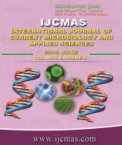


 National Academy of Agricultural Sciences (NAAS)
National Academy of Agricultural Sciences (NAAS)

|
PRINT ISSN : 2319-7692
Online ISSN : 2319-7706 Issues : 12 per year Publisher : Excellent Publishers Email : editorijcmas@gmail.com / submit@ijcmas.com Editor-in-chief: Dr.M.Prakash Index Copernicus ICV 2018: 95.39 NAAS RATING 2020: 5.38 |
Petroleum-based products are the major source of energy for industry and daily life. Leaks and accidental spills occur regularly during the exploration, production, refining, transport, and storage of petroleum and petroleum products. Crude oil-impacted tropical soil and natural water samples (0 - 30cm depth) were obtained from the Niger Delta, Nigeria. A total of twenty seven bacterial species of relevance in bioremediation were isolated and characterized using standard and conventional methods. The predominant species belong to the genera Pseudomonas and Proteus. The ability of Pseudomonas aeruginosa, Pseudomonas stutzeri, Proteus mirabilis, Serratia marcescens and Bacillus subtilis to degrade diesel oil was studied. The results showed maximal increase in optical densities and total viable counts, however, with decrease in pH of the culture media after 8 - day incubation period. Typical generation times varied between 0.89 and 4.0d for Pseudomonas aeruginosa, 0.85 and 0.32d for Pseudomonas stutzeri, 0.8 and 3.9d for Proteus mirabilis. All the isolates utilized petroleum hydrocarbon as sole carbon and energy sources for growth on Minimal Salt Medium (MSM) supplemented with (0.2%) diesel oil. The isolates were tested against 7 different antibiotics and were found to be resistant to 5 antibiotics. Consequently, Twenty four isolates were randomly selected for plasmid DNA isolation. The presence of plasmid DNA was confirmed in 22 isolates where the molecular weight size ranged between 7 – 23.1kb. Although, Pseudomonas aeruginosa, Proteus mirabilis and Bacillus subtilis had low specific growth rate on Diesel, they were the best choice for bioremediation since they had the highest mean generation time respectively. The knowledge of the potentials of these isolates to degrade hydrocarbons will increase the possibilities of developing novel strains and strategies for removing hydrocarbon pollutants from the natural environment.
 |
 |
 |
 |
 |